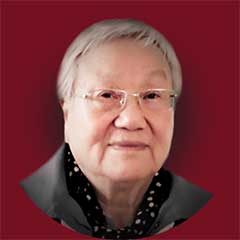‘They Have Ruined My Family’
When the pressure became unbearable in 2017, Yinxian Xue, a retired physician at the General Administration of Sport of China (CSGAS), fled China. She has been a whistleblower of systemic doping among Chinese athletes. Voice of America visited her in Ravensburg, Germany, where she now resides.

Yinxian Xue
Retired Physician
Beijing-Ravensburg, Germany
阅读本文中文版
阅读本文中文版
My name is Yinxian Xue. I’m 80 years old. I had been a physician for the China national sports teams for 36 years. Since the 1980s, I’ve been openly against systemic doping among Chinese athletes. For that, I’ve been persecuted. My family was ruined.
Xue is the whistleblower on systemic doping among Chinese athletes. In 2017, she and her family fled China and obtained political asylum in Ravensburg, Germany.
Reporter: We interviewed you five years ago, and I’m so happy that we could come in person this time to talk to you. I want to first ask, how have the past five years in Germany been? Are you satisfied with your life?
Yinxian Xue, Retired Physician, General Administration of Sport of China: Very satisfied. As an old Chinese poem goes, ‘Home is where the heart is.’ Here, people are friendly and treat others with sincerity. Not like in China. You have to watch what you say. You have to think about who might report you. … The Cultural Revolution has made people unkind. … People are not kind anymore.
Reporter: You left China in 2017. Was the pressure unbearable then?
Yinxian Xue: They have ruined our family, my son’s family. My oldest son was put into prison for 114 days because of his anti-doping advocacy.
In the late 1970s, doping was introduced among Chinese athletes. Xue is one of the rare opponents.
Yinxian Xue: Zhanghao Chen, a former physician for the China national sports teams, was sent to France in 1979. When he came back, he started to introduce these substances to Chinese athletes. His goal was clear: Use them on the top athletes.
Reporter: Are there any other physicians who opposed the idea as you did?
Yinxian Xue: Most physicians were afraid. They didn’t want to use it, but when they heard that taking hormones could help athletes avoid injuries … the physical therapists were happy … they wouldn’t have too much work. Later, they got used to it — just followed the trend. Chinese people are really afraid of authority. … This is particularly true in the sports field.
Later, everyone began to avoid me. The athletes were taking these substances behind my back. Maybe they got permission from the higher-ups. In 1984, I was the head of the medical team, managing roughly 30 physicians. Later, they replaced me with someone else.
In the 1980s, the Chinese were trying to increase the athletes’ red blood cells to improve their performance.
Weidong Yang, Oldest Son of Yinxian Xue, Independent filmmaker: This is Weisi Luo, former physician at the General Administration of Sport of China. Here are her two articles.
This article is talking about taking in large amounts of iron. For an average person, the maximum intake is 15 milligrams. The athletes were taking up to 800 milligrams per day.
Yinxian Xue: Six hundred to 800 milligrams. They started to take iron 20 days prior to their competitions.
Weidong Yang: This is the physician who replaced my mom. She wrote this thesis herself, published in this national level medical magazine.
Look at all the athletes [who took substances] here. Here are a few names: Ping Lang, Yan Liang, Meizhu Zheng.
In 1985, the International Olympic Committee banned blood doping, but it is difficult to detect compared to other substances. In Germany, Xue continues her anti-doping advocacy and is getting ready to publish her book, “Chinese Doping.” But the pressure follows her.
Yinxian Xue: After I arrived in Germany, [the Chinese authorities] stripped away all my benefits. All remaining benefits were cut off. … They sent me a text message, ‘All benefits are gone.’
I just don’t like injustice. People say I’m the kind of person who couldn’t help but speak my mind.
With systemic doping, you are stealing gold medals from other athletes. Those gold medals are stolen.
Runners
Listen to their stories











